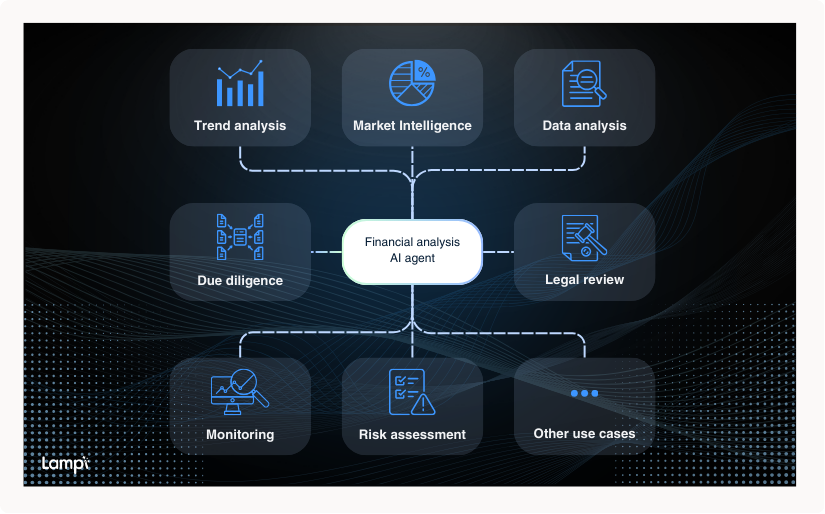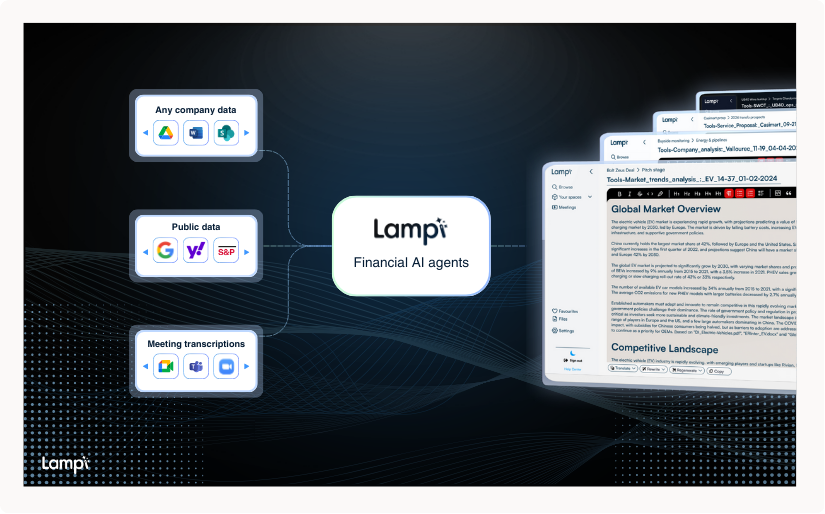The Future of Financial Analysis with AI Agents
Discover how the advanced capabilities of large language models (LLMs) to analyze, interpret, and generate content will dramatically transform financial analyses.

The advanced capabilities of large language models (LLMs) are unlikely to change what financial analysts do, but they will dramatically transform how they do it.
Financial and research analysts deal daily with a large volume of business insights from financial and non-financial data, such as market and economic reports, filings, meeting transcripts, public information, etc., with the primary objective of understanding the financial health of a company or market. Their tasks involve identifying and understanding notable changes and trends, the competitive landscape and macroeconomic conditions, computing and evaluating financial ratios, and synthesizing the results to gain further insights.
They face many challenges because of the increasing variety of sources and data they must synthesize and analyze (often under time pressure) to provide insights and recommendations. While some studies have attempted to quantify the amount of time employees spend searching for information, with estimates ranging from 2 hours to 3.6 hours per day, the amount of time spent by analysts may be even greater.
There is no doubt that Artificial Intelligence (AI) and Generative AI applications will have an impact on their daily tasks, given the ability of LLM-based applications to search, retrieve, analyze, interpret, and generate content. AI is already used in financial firms to perform a wide range of tasks, including summarization of complex reports, information extraction, text generation, etc. AI distills financial statements and market reports into concise summaries in seconds, and then answers follow-up questions to provide clarifications, comparisons, and contextualization.
The recent rise of AI agents promises to go one step further by automating many of the tasks of financial analysts, freeing them to focus on high-value creative work. Unlike traditional AI tools that respond to specific human prompts, AI agents can perceive, reason, act and learn autonomously, without constant human guidance. To learn more about AI agents and agentic workflows, read our previous article "Why is the future about AI agentic workflows?".
Financial analysis AI agents
The purpose of AI Financial analysis agents is to augment analysts by turning raw data from investment analyst notes, account filings, earnings transcripts, or any other sources into meaningful insights, enhancing the decision-making process. Simply imagine an AI agent that retrieves all necessary market data, autonomously performs an analysis, with advanced reasoning, and drafts a complete and fact-based reports.
Here’s how AI agents can augment financial analysis:

Market Intelligence
Research is essential for effective financial analysis, involving the collection and analysis of relevant information from multiple sources. AI agents enhance this process by efficiently searching databases and online sources through multi-step workflows, extracting key insights, and generating concise summaries or analysises based on it.
Data analysis
Financial analysis AI agents can extract key insights and perform qualitative and quantitative analysis on structured and unstructured data. By extracting key insights, they are also able to aggregate mutiple sources of financial and non-financial information to produce detailed business or market analysis.
Risk assessment
AI agents can identify potential risks and conduct comprehensive risk assessments by examining financial and non-financial data based on multiple source of information and advanced reasoning capabilities.
Due diligence
Financial analyst AI can conduct comprehensive due diligence by reviewing large volumes of data, including financial statements, company and market reports, or other relevant documents, extracting key information, classifying them based on relevance or risk factors, or summarizing complex legal or financial documents. It saves time and effort, provides deeper insights and uncovers potential issues that are critical to informed decision-making.
Legal review
AI agents can accelerate the review and negotiation of legal documents by extracting key legal terms and analysising entire agreements. It streamlines legal compliance and reduces the time spent on reviewing documents.
Monitoring
Traditional monitoring involves a lot of manual work to track performance and manage risk. AI agents can simplify this by pulling data from sources such as financial statements, investment schedules, notices, or investor reports and draft weekly reports on a company or a market. AI agents can also extract common information, and organize it in a standardized format that makes it easier to spot trends, which can be particularly useful for assessing performance across portfolio companies.
These use cases, which are not exhaustive, illustrate the diverse applications of AI agents in financial analysis, showcasing its potential to transform various aspects of the industry through increased efficiency, accuracy, and strategic insights.
Can AI agents outperform professional analysts?
The question of whether AI agents can outperform human financial analysts is rising, with significant implications for the future of financial analysis. In fact, and although AI agents show great potential, they currently face several limitations that prevent them from fully replacing human expertise.
- First, effective financial analysis requires a deep understanding of industries and the macroeconomic environment. Vanilla AI models may lack this broader context, which is essential for making informed decisions, compared to (human) analysts who have a deep understanding of specific environments and current macroeconomic trends. Humans are better able to incorporate their knowledge of broader context by taking into account soft information (e.g., industry knowledge, and political, regulatory and macroeconomic factors).
- Second, financial analysis is inherently complex and ambiguous, requiring critical thinking, common sense, intuition, and the flexibility of the human mind. While AI can quickly process and analyze vast amounts of data and that new LLMs are getting better and better, particularly at reasoning tasks, AI may still struggle with the nuanced reasoning and judgement that humans excel at.
- Third, LLMs are primarily trained on language-based data rather than quantitative financial analysis. This means they can summarize texts and answer questions, but often falter when it comes to interpreting numerical data and making complex judgements. They often struggle with calculations, human-like interpretations and complex judgements.
Additionally, the field of AI agents is still in its early stages and it's facing some technical challenges.
If these factors stack the odds against AI agents achieving a human-like performance in performing financial tasks, their ability, notably to quickly analyze large amount of data, are more complementary to human expertise. As well as being complementary, AI agents can be seen as new recruits, capable of carrying out specific tasks. The best approach would be to recruit your "army" of AI agents, each specialised in carrying out a specific task.
The combination of AI’s data processing capabilities and human intuition and judgment remains the most effective approach.
Lampi's AI agents framework
At Lampi AI, we help financial analysts to gain insights by quickly gathering knowledge from internal and public data, and produce customizable reports in the desired format in minutes — not days or weeks — thanks to AI agents connected to enterprise data, enabling analysts to work faster and with greater accuracy.
Our AI agents turn hours of time-consuming analysis and processes into minutes, helping you focus on high-value work, complete commitments faster, spend less time on manual tasks and take on more clients.
Simply select data relevant to your task and ask specialized AI agents to complete it end-to-end. All responses and reports are exhaustively referenced and linked to the source documents, making it easy for analysts to fact-check insights. They can also include custom charts and graphs powered by advanced data visualization AI.

Leveraging our previous expertise in the sector, we have developed a whole financial analysis AI agent framework to perform identified tasks that add value to financial firms. Our pre-trained agents, or “supervised agents”, are experts in performing domain-specific tasks, such as investment analysis, market analysis, company analysis, etc., and provide highly detailed and accurate answers based on internal and external data.
We have augmented and fine-tuned LLMs with financial data and designed patterns for specific financial analyses that effectively “teach” the agent to mimic a financial analyst. In particular, as a part of their analysis, financial analysts identify key insights common to financial analysis and financial ratios, synthesize all this information, and form detailed and accurate financial reports.
Our AI agents will help you to:
- conduct due diligence with greater speed and precision,
- automate the production of detailed investment memos and due diligence reports for internal and external review,
- leverage your firm's collective knowledge and make smarter investment decisions,
- instantly access insights from vast amounts of data thanks to Lampi AI's AI search capabilities,
- assess investment opportunities more efficiently by scanning market data, industry reports, and financials data.
- interact with data rooms, reports, or any legal or industry-specific reports to get answers with sources,
- configure, generate, and automate customizable company overviews, industry reports, pitch decks, or investment memorandums,
- and more.
At Lampi AI, we understand that every firm has distinct processes, and that’s why Lampi AI is customizable to reflect your financial processes. We allow you to easily build and save your custom AI agents capable of sophisticated and multi-step workflows, tailored to replicate your specific day-to-day tasks, but we also collaborate closely with your team to build custom AI agents that fit your firm's unique workflows. No matter how complex the workflow is.
Our solution can be deployed on-premise, ensuring that all data, including private client data, stays within the organization's walls. Lampi AI has always been committed to protecting customer data, privacy, and safety to help enterprises use our solution with peace of mind.
Ready to augment your financial analyses with AI? Contact us to request a demo.

